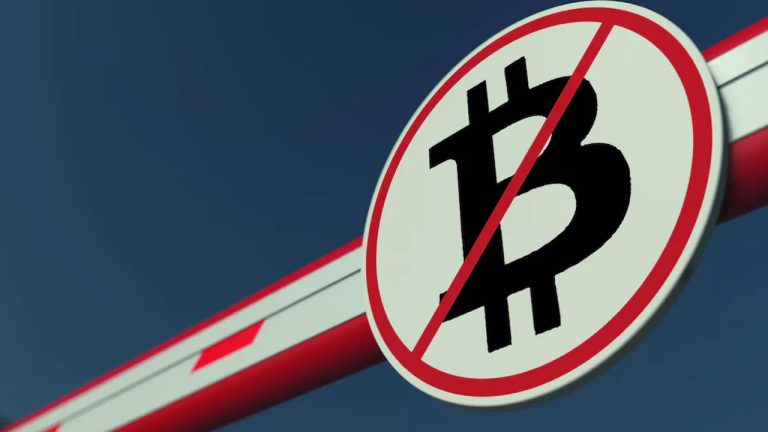 On Tuesday, the U.S. Senate Committee on Banking, Housing, and Urban Affairs, also known as the Senate Banking Committee, held a hearing to discuss the recent bank collapses in the United States and the regulatory response. Throughout the testimonies, digital assets and crypto businesses were mentioned. Senate Banking Committee chairman Sherrod Brown claimed on Tuesday […]
On Tuesday, the U.S. Senate Committee on Banking, Housing, and Urban Affairs, also known as the Senate Banking Committee, held a hearing to discuss the recent bank collapses in the United States and the regulatory response. Throughout the testimonies, digital assets and crypto businesses were mentioned. Senate Banking Committee chairman Sherrod Brown claimed on Tuesday […] Over the past century, the number of American banks has significantly decreased, dropping from 30,000 banks in 1921 to 4,997 U.S. banks in 2021, according to data from the Federal Reserve. Recently, the U.S. central bank denied Custodia Bank of Wyoming, a financial institution that holds $1.08 for every dollar deposited by customers. Although there […]
Over the past century, the number of American banks has significantly decreased, dropping from 30,000 banks in 1921 to 4,997 U.S. banks in 2021, according to data from the Federal Reserve. Recently, the U.S. central bank denied Custodia Bank of Wyoming, a financial institution that holds $1.08 for every dollar deposited by customers. Although there […] Since the collapse of three American banks friendly to cryptocurrency businesses and the U.S. government’s insistence that crypto assets are “risky investments,” many speculators believe bureaucrats are purposely closing access to cryptocurrencies. Some refer to the U.S. government’s recent enforcement as “Operation Chokepoint,” a mission aimed at eliminating access to the crypto ecosystem in the […]
Since the collapse of three American banks friendly to cryptocurrency businesses and the U.S. government’s insistence that crypto assets are “risky investments,” many speculators believe bureaucrats are purposely closing access to cryptocurrencies. Some refer to the U.S. government’s recent enforcement as “Operation Chokepoint,” a mission aimed at eliminating access to the crypto ecosystem in the […] After UBS acquired Credit Suisse and close to a dozen financial institutions injected $30 billion into First Republic Bank four days ago, S&P Global downgraded First Republic’s shares to junk status on Sunday. Investors are concerned that the cash infusion from 11 major financial institutions may not address the bank’s liquidity issues. First Republic’s shares […]
After UBS acquired Credit Suisse and close to a dozen financial institutions injected $30 billion into First Republic Bank four days ago, S&P Global downgraded First Republic’s shares to junk status on Sunday. Investors are concerned that the cash infusion from 11 major financial institutions may not address the bank’s liquidity issues. First Republic’s shares […]
Currency swap lines have been used during times of crisis in the past, such as the 2008 global financial crisis and the 2020 coronavirus pandemic.
The United States Federal Reserve has announced a coordinated effort with five other central banks aimed at keeping the U.S. dollar flowing amid a series of banking blowups in the U.S. and in Europe.
The March 19 announcement from the Fed comes only a few hours after Swiss-based bank Credit Suisse was bought out by UBS for $3.25 billion as part of an emergency plan led by Swiss authorities to preserve the country’s financial stability.
According to the Federal Reserve Board, a plan to shore up liquidity conditions will be carried out through “swap lines” — an agreement between two central banks to exchange currencies.
Swap lines previously served as an emergency-like action for the Federal Reserve in the 2007-2008 global financial crisis and the 2020 response to the COVID-19 pandemic. Federal Reserve-initiated swap lines are designed to improve liquidity in dollar funding markets during tough economic conditions.
Coordinated central bank action to enhance the provision of U.S. dollar liquidity: https://t.co/Qs4cYY8BFO
— Federal Reserve (@federalreserve) March 19, 2023
“To improve the swap lines’ effectiveness in providing U.S. dollar funding, the central banks currently offering U.S. dollar operations have agreed to increase the frequency of seven-day maturity operations from weekly to daily,” the Fed said in a statement.
The swap line network will include the Bank of Canada, Bank of England, Bank of Japan, European Central Bank and the Swiss National Bank. It will start on March 20 and continue at least until April 30.
The move also comes amid a negative outlook for the U.S. banking system, with Silvergate Bank and Silicon Valley Bank collapsing and the New York District of Financial Services taking over Signature Bank.
The Federal Reserve, however, made no direct reference to the recent banking crisis in its statement. Instead, it explained that they implemented the swap line agreement to strengthen the supply of credit to households and businesses:
“The network of swap lines among these central banks is a set of available standing facilities and serve as an important liquidity backstop to ease strains in global funding markets, thereby helping to mitigate the effects of such strains on the supply of credit to households and businesses.”
The latest announcement from the Fed has sparked a debate about whether the arrangement constitutes quantitative easing.
U.S. economist Danielle DiMartino Booth argued that the arrangements are unrelated to quantitative easing or inflation and that it does not “loosen” financial conditions:
MISINFORMATION PREVENTION MOMENT
— Danielle DiMartino Booth (@DiMartinoBooth) March 19, 2023
Swap lines do NOT constitute loosening financial conditions.
One more example: You're a doctor. A patient is having cardiac arrest. You can SEE the paddles to revive him/her but you can't REACH the paddles. These swap lines HAND you the paddles. https://t.co/RXOPiBmsif
The Federal Reserve has been working to prevent an escalation of the banking crisis.
Related: Banking crisis: What does it mean for crypto?
Last week, the Federal Reserve set up a $25 billion funding program to ensure banks have sufficient liquidity to cover customer needs amid tough market conditions.
A recent analysis by several economists on the SVB collapse found that up to 186 U.S. banks are at risk of insolvency:
“Even if only half of uninsured depositors decide to withdraw, almost 190 banks are at a potential risk of impairment to insured depositors, with potentially $300 billion of insured deposits at risk.”
Cointelegraph reached out to the Federal Reserve for comment but did not receive an immediate response.
 Interest in the U.S. banking crisis has risen greatly over the past two weeks, as shown by Google Trends data. There has been a sharp increase in queries related to search terms such as “banking crisis,” “bank collapse,” and “bank failure.” On March 13, 2023, the search term “banking crisis” reached the top Google Trends […]
Interest in the U.S. banking crisis has risen greatly over the past two weeks, as shown by Google Trends data. There has been a sharp increase in queries related to search terms such as “banking crisis,” “bank collapse,” and “bank failure.” On March 13, 2023, the search term “banking crisis” reached the top Google Trends […] A European lawmaker has urged authorities to impose a ban on cryptocurrencies citing the current crisis in the banking sector as a reason. Johan Van Overtveldt, former finance minister of Belgium, believes these assets bring no economic or social value. Belgium’s Ex-Finance Minister Suggests Ban on Decentralized Digital Currencies Member of the European Parliament, Johan […]
A European lawmaker has urged authorities to impose a ban on cryptocurrencies citing the current crisis in the banking sector as a reason. Johan Van Overtveldt, former finance minister of Belgium, believes these assets bring no economic or social value. Belgium’s Ex-Finance Minister Suggests Ban on Decentralized Digital Currencies Member of the European Parliament, Johan […] The European Central Bank (ECB) has convened to raise three of its key interest rates by 50bps (0.5%), fueled by the persistence in the inflation numbers reported by the bloc. Christine Lagarde, president of the institution, stated that the banking sector in Europe was resilient and that the institution was ready to provide liquidity if […]
The European Central Bank (ECB) has convened to raise three of its key interest rates by 50bps (0.5%), fueled by the persistence in the inflation numbers reported by the bloc. Christine Lagarde, president of the institution, stated that the banking sector in Europe was resilient and that the institution was ready to provide liquidity if […] At around 7:30 a.m. ET, the price of bitcoin skyrocketed past the $27,000 range to a high of $27,025 per unit. Precious metals, or PMs, like gold and silver, also rose between 1.98% and 2.12% against the U.S. dollar over the past day. While many market observers are wondering why specific assets like PMs and […]
At around 7:30 a.m. ET, the price of bitcoin skyrocketed past the $27,000 range to a high of $27,025 per unit. Precious metals, or PMs, like gold and silver, also rose between 1.98% and 2.12% against the U.S. dollar over the past day. While many market observers are wondering why specific assets like PMs and […]
Silicon Valley Bank and Silvergate Bank were crucial to many in the cryptocurrency industry, and it’s fueling theories that regulators encouraged their downfall.
Global economic conditions are tightening; interest rates are in flux; and inflation has yet to be curbed. Considering the economic headwinds, the fact that Silvergate Bank, Silicon Valley Bank and other banks are breaking is not surprising.
But why now? Quickly rising interest rates are extremely disruptive to banking models, but the collapse of these particular banks has raised eyebrows. It just so happens that these banks are important to the crypto industry.
Government agencies often use the selective enforcement of convoluted or unclear rules and regulations to pursue agendas. They can then defend the action by saying that the public’s interest was at stake.
Here’s the analogy: An apartment building needs to be removed for an upcoming freeway expansion project. The choices are to either execute eminent domain, a scenario where the government has the ability to overrule all leases and ownership and take control of the property. This would not be a popular decision with the community. There is another option. The local government could simply not enforce pre-existing regulations around maintenance and upkeep, thus letting the property slip into disrepair.
When I warned about chokepoint a month ago, I didn’t think in a million years that they would go 100x further and actually take down the top 3 crypto-facing banks. It’s breathtaking. And this wasn’t an accident. It was a demolition https://t.co/HacUQfUWWF
— nic carter (@nic__carter) March 13, 2023
A government inspector shows up. The property needs major updates or it will have to be condemned. The property owner cannot afford to get the property up to code. And the inhabitants must move and be relocated for their own safety.
This is the way the government works.
The government sets up broad rules and regulations — selectively enforces them — and creates a situation where the outcome they need is achieved. They skirt direct accountability and public ire but achieve the action needed.
As market conditions begin to tighten, businesses that are discretionary and speculative suffer first — e.g., businesses such as startups, restaurants and hedge funds. Thus, banks in the tech and crypto sectors become weakened first. Most banks focus on serving specific industries. If a bank’s customers are failing, the bank is in a precarious position.
I guess I’ll be the first @ewarren critic to do what’s right and publicly thank her for her part in accelerating #Bitcoin When history books are written, Operation Chokepoint and Warren facilitating a bank run may prove to be the “proverbial straw” that broke fiat’s back.
— John E Deaton (@JohnEDeaton1) March 17, 2023
If a bank is publicly listed, once public investors understand the predicament, the results are catastrophic. SVB tried to raise additional capital via public markets to bail themselves out, but markets caught wind and went short. Depositors fled to “safer” banks. A classic bank run ensued. The market, in effect, prepped the bank for regulatory intervention.
The failure of Silvergate and SVB and the takeover of Signature have arguably signaled the start of a regulatory effort to actively cull crypto banks. If crypto can be surgically separated from traditional banking, this solves many perceived problems for regulators. Once crypto on-ramps are eliminated, the category can be aggressively regulated without the perception from the public that an investment opportunity is being taken away.
Good news: we’re not all conspiracy theorists
— Lizzy Fallon (@FallonLizzy) March 16, 2023
Bad news: “chokepoint 2.0” appears to very well be legit https://t.co/cQ8ykByInb
However, this is not a conspiratorial plan. Rather, the regulators are taking advantage of balance sheet weakness and poor banking practices to set up scenarios where it then seems logical that they should intervene. There was no bank run at Signature. Regulators took the advantage of a chaotic situation to pursue an agenda.
Startups, especially crypto startups, are by their very nature speculative. Blockchain at scale is an “unknown quantity” of speculation due to a lack of regulation. Recall the analogy above. The lack of oversight and regulatory direction has led financial institutions that serve tech and crypto companies to push the boundaries.
Because of macro market conditions, that type of experimentation has created a situation that puts these banks on the edge of solvency. As regulators step in to “save the day,” they get a two-for-one deal. They are perceived to have the public’s interest in mind as they eliminate critical functionality for the crypto industry.
No bank can survive a bank run. Fractional banking has led to a system where banks simply do not have the assets to entirely cover customer deposits. If investors begin to question the stability of a bank and start to withdraw deposits, that bank will either fail or need to be bailed out. Contagion is a meme that, like other memes, is built on a deep, potentially uncomfortable truth. Banks are not as stable as the public is led to believe.
Related: Why isn’t the Federal Reserve requiring banks to hold depositors’ cash?
Nic Carter calls this recent regulatory focus on crypto banks “Operation Chokepoint.” However, bank failures accelerated by regulatory targeting destabilize the perceived stability of the entire financial system. We see this as runs on institutions like First Republic — a traditional medium-sized bank — play out. More runs are coming.
Market forces opened the door for regulators to aggressively cull crypto banks through controlled demolition. But the demolition has focused investors on existing deep systemic risks. The controlled demolition might serve the immediate agenda, but contagion is on the brink.
This article is for general information purposes and is not intended to be and should not be taken as legal or investment advice. The views, thoughts and opinions expressed here are the author’s alone and do not necessarily reflect or represent the views and opinions of Cointelegraph.